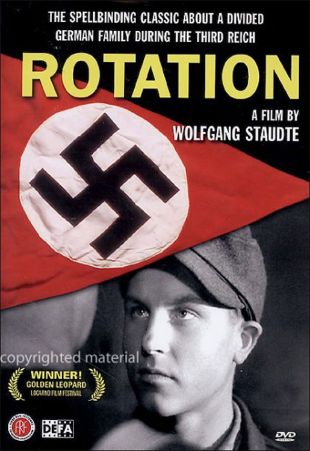Rotation is one of the most notable films produced by DEFA, the film production company started in Germany's Soviet sector, in the immediate aftermath of World War II. The "hero," Hans Behnke (Paul Esser), is a machinist who makes a series of ethical compromises to support his family that leads to his ruin. At the beginning the youthful optimism that follows his marriage to Charlotte (Irene Korb) and the birth of their son Helmut is eroded by the poverty and unemployment of the Weimer Republic. Frustration and anger lead brother-in-law Kurt (Reinhold Bernt) to the Communist Party while another family friend joins the National Socialists. Hans gets a job with a printing company that produces propaganda for the Nazis, but he resists joining the party. The shock of his eventual enlistment is through the offhand way it's conveyed -- a tiny portrait of Hitler on an apartment wall, a swastika pin on the lapel of a jacket draped over the kitchen chair. Meanwhile Helmut (Karl-Heinz Deickert) has grown up poor and partially uncared for, finding family in the big brothers of the Hitler Youth. When Kurt returns looking for assistance in printing resistance fliers and Hans reluctantly agrees to help. Helmut reports his father. He's arrested and sent to prison. The combination of director Wolfgang Staudte's ease with actors and cinematographer Bruno Mondi's skills with fluid tracking shots and expressionist lighting and framing techniques produces a number of thrilling hyper-realistic scenes. An argument between Kurt and Hans in the Behnke's bombed out apartment, conducted by candlelight, gradually turns abstract, highlighting the angst of German citizens torn between resistance and survival. Characters are frequently framed through bars and though it's a rather obvious visual theme, it effectively builds until the epic climactic battle of Berlin sequence (a technically remarkable highlight), when a final close-up of a drowning bird cage, a canary desperately flitting it's beak through the bars, represents the self-destructive confines of Nazism. Staudte is both sympathetic and critical towards Hans. Making the film was reportedly his attempt to deal with his own passivity during the war and the film is an angst-ridden and convincing chronicle of how thousands of ostensibly "good" people supported a terrible regime. The benignly optimistic ending, playing off the film's theme of rotation (echoed through the spinning of the printing press), has a new generation offering hope and optimism, with the underlying implication that their corruption seems just as likely. Supposedly the pacifist Staudte deliberately intended to include this as a warning about the Cold War, and was roundly criticized for it by his Soviet superiors.

Rotation (1948)
Directed by Wolfgang Staudte
Share on